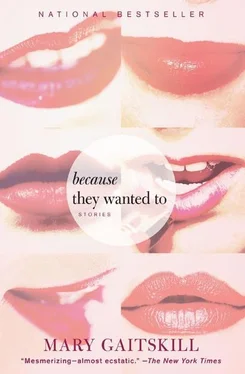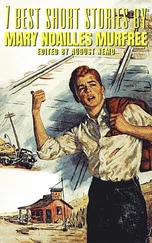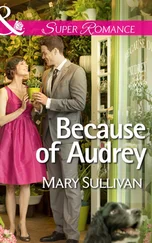I thought of how he had pretended to kiss me and then pulled away. His words did not make sense to me, but many things don’t make sense to me. “You’re probably right,” I said slowly. “We don’t know each other, and it might be a bad experience. I’ve had a lot of bad experiences.”
A look of indulgent emotionality came over his face, as if he were watching a sensitive movie about the special pain of a lonely older woman who’s just been rejected by a younger guy. I felt a little surge of indignation that quickly devolved into pieces of uncertainty and vague goodwill. I was awfully tired. “Can you see what time it is?” I asked.
“It’s five o’clock.”
“Fuck!” I took his jacket from the floor and wrapped it around my shoulders. “The last time I got involved with a guy we didn’t have sex for three weeks, which naturally made me want him desperately. So when we finally did it, it felt like a cataclysm; I went into an emotional frenzy, and he got pulled right into it. Then the sex wore off, and there we were, stuck in all this bogus emotion. It seems like it doesn’t work no matter what you do.”
Mild surprise overtook his look of indulgent sympathy; his face was shadowed by mournful tenderness. It occurred to me that he might feel pain too. We were both silent. Our silence comforted me. I held my hand out to him, and he took it in his.
“I’d like to see you again,” he said.
“I don’t think so,” I said. “I mean, there’s the old girlfriend and the other women and what have you. It sounds like a mess, and I’m pretty busy, actually. But I’m glad I met you. I think you’re a nice person.”
He almost flinched when I said that. His lips parted and his eyes became bleak and deep. He let go of my hand and stood up. I thought he was going to ask for his jacket, but instead he went to my bookcase and withdrew a book. He looked at the cover and then turned it over. It was my only published book of poetry. I had published it ten years before, won a few awards, and then collapsed. I’d published nothing since.
“Is this you?” he asked.
“Put that back,” I said sharply.
He replaced it and stared at me with a look I couldn’t read.
“I’m sorry,” I said. “I didn’t mean to be rude.”
“It’s okay,” he said. “Sometimes when girls come to my place, they pick up stuff, and I don’t like it. I say, ‘Stop going through my things.’ You just told me to stop going through your things.” He looked at me as if amazed.
I didn’t say anything.
“Maybe I’d like to read your poems.”
“I don’t write poems anymore. That book is really old.”
He got his boots, and as he bent over to put them on he cut a dainty fart. He paused in his bend and made a fussing noise, as if irritated at himself for farting. It was okay with me, though, and I think he realized that. I hoped so. Once, I fell asleep on a train and drooled in front of my fellow passenger; when I woke and glanced at him in embarrassed realization, I saw right away that he had borne with my drool. That subtle acceptance from a total stranger was deeply satisfying to me, and I was pleased to give it to someone else.
He stood up and stumbled over a cat toy. “I’ll miss you,” he said.
“Oh, please.” My words were like quick, shallow water. I handed him his jacket, and he put it on.
“You won’t give me your number?” he asked.
I leaned forward and put my head on his shoulder. Sheathed in his jacket, it felt impersonal and kind. He held me for a moment, and I thought I could feel him experimenting with the sensation of kindness.
“No,” I said.
After he left, I sat for almost an hour, allowing my body to return to aloneness and safety. Then I took a bath and got in bed. It was almost seven o’clock, and the room was filling with daylight. My moist skin made my pajamas damp and warm. There were sounds from the courtyard outside my window; two of my neighbors were out in the garden, talking in low voices. They were talking about the bonnets and dresses they were making to wear at the Indulgence in the Park Easter celebration.
I wondered why I had told Frederick that I thought he was nice. Probably for the same reason that I had sweet dreams about a petty sadist. I tried to think of my dead sex partner, but my memories of him were truncated, and gray with elapsed time. I could only imagine him with flat, terrified eyes, his hands making a gesture that was too cramped and weak to signify anything. I don’t know why I imagined him this way, since I had never seen him make such expressions or gestures. I tried to imagine saying goodbye to him, but it didn’t work. I had a sensation of all my memories growing truncated and gray, stretching out over a lengthening span of years, slowly dissolving into broken pieces of imagery weighted with inexplicable feeling.
I turned onto my side and closed my eyes, as if doing so would finally bring the experience to an end. I would’ve liked to cry, but I couldn’t. From the garden, I heard one of my neighbors describe his bonnet as “robin’s-egg blue.” He must’ve shown it to the other neighbor, because I heard a second voice say, “Oh, it’s so special.” He was being sarcastic, but he also meant it.
When I woke it was afternoon. Through my open window, the day felt dull and warm. I turned onto my side and remembered Frederick. I remembered his blithe, half-conscious meanness, the nervous toss of his head, the puzzlement in his voice when he had said, “I like you.” Under his silly contempt there had been a little pocket of tenderness, and I had seen it. I imagined that I lay against him, and that he held me. In my imagination, it did not matter that he was thirteen years younger than me. The tenderness was strange and slightly mortifying.
When I went into my living room, I saw the Polaroid that had been taken of Frederick and me lying on the floor, harmlessly reflecting sunlight off its cheap, shiny surface. I picked it up and studied it. The girl who had taken it came into my mind and sparkled for a moment. Frederick posed like a conceited teenager; his face was hard, closed, and very handsome. It looked as if he had struck the pose automatically. Beside him, I was slightly out of focus, and my eyes were woefully large. The picture nonplussed me, but in a curious way it also pleased me. I put it on the kitchen table and looked at it while I drank my coffee.
When I went out to get my mail, I found that he had left a note on my mailbox. I sat on the front steps, smiling foolishly. Sunlight tingled on a tiny, dislocated rhinestone that someone had lost without noticing. The note was badly spelled and almost incoherent, and that, for some reason, endeared him to me. He had given me his phone number.
His voice was warmer and more direct than I remembered it. He said a man who had been at the party had called him that morning to ask how it was to spend the night with me. “And I told him it was none of his business,” he said. His words rang with resolute gallantry, but they bewildered me; they sounded completely artificial, yet I sensed that he wanted to believe himself gallant.
We planned to meet for a drink at seven o’clock. He said he had an appointment at ten, which gave us three hours together. Shyly, I said I was looking forward to seeing him. He said he felt the same way. Then he asked me if I felt “compromised.” I knew what he meant, but I pretended I didn’t; there was vibrant excitement in his voice, which I wanted to resist. “No,” I said. “Why would I feel compromised?” I paused. “Do you?”
Half an hour before the meeting, I opened my closet to dress and realized that I was frightened. In part I was afraid simply because I had not been on a date for over a year. But mostly I was afraid that the peculiar absence I had felt in this boy was a harbinger of some-thing worse than absence, something he himself was not fully aware of. But I didn’t want to be afraid. I especially didn’t want to be afraid of a kid. So I pushed my fear down under my thoughts. In sup-pressed fear, I chose a high-necked, calf-length dress that once belonged to my mother. It was a quietly beautiful dress, and wearing it usually made me feel both feminine and strong. As I put it on, however, my expectation of feeling good was just barely undermined by a feeling of shame so subtle I didn’t identify it for what it was. Before I could, I suppressed it as well.
Читать дальше












